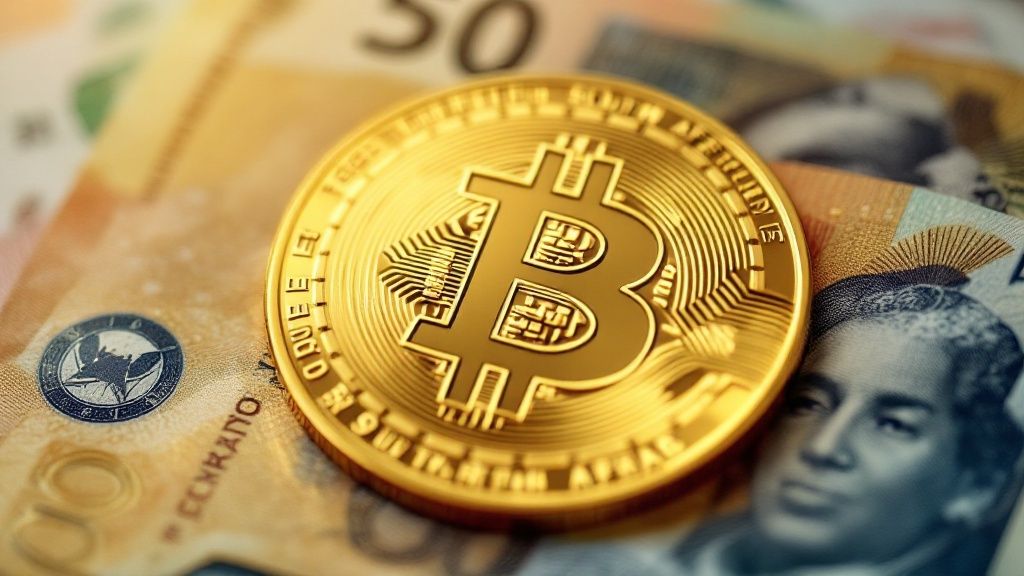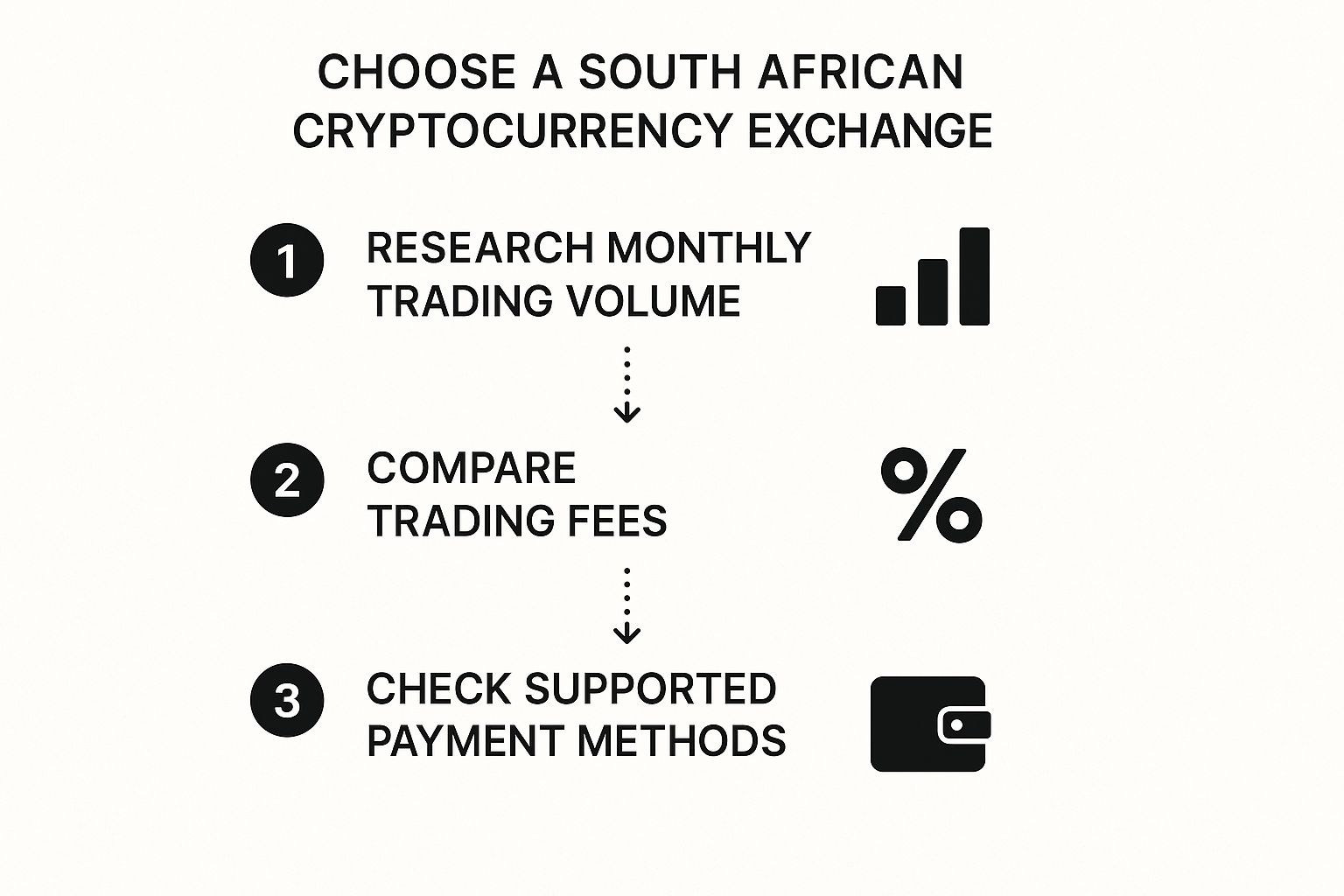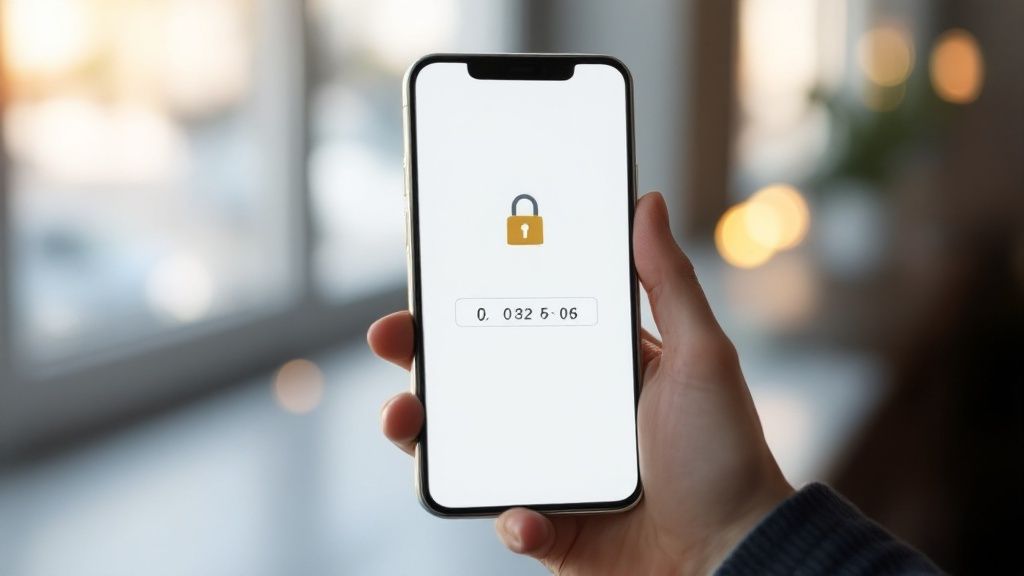At its core, a South African cryptocurrency exchange is a digital marketplace where you can buy, sell, and trade cryptocurrencies like Bitcoin and Ethereum using the South African Rand (ZAR). The simplest way to think about it is like a stock exchange, but instead of trading company shares, you're trading digital assets. These platforms are the main entry point for South Africans into the global crypto economy.
Welcome to the South African Crypto Landscape
South Africa has quickly become a major player in the digital currency space, showing a real enthusiasm for cryptocurrency. In fact, between July 2023 and June 2024, the country handled an incredible $26 billion in crypto value. This volume makes it one of Africa's largest and most developed crypto markets. This isn't just about people speculating; it's being driven by genuine, practical needs.

This buzzing ecosystem is a mix of powerful homegrown exchanges and big international players, all vying for a slice of a rapidly expanding user base. South Africa's well-established financial infrastructure gives these digital marketplaces a strong foundation to build on, bridging the gap between traditional banking and the world of crypto.
Why Is South Africa a Crypto Hotspot?
So, what's behind South Africa's rise as a crypto leader? A few key things stand out. Unlike many places where crypto is mainly a retail game, South Africa is seeing a real meeting of minds between traditional finance (TradFi) and digital assets. This "TradFi-crypto nexus" is a massive development, pointing to a market that's maturing and finding its feet.
Here are the main drivers:
- Growing Institutional Interest: The big financial players are taking notice. Absa Group, for instance, is already working on institutional-grade custody solutions. This is the kind of foundational service that gives large-scale investors the confidence and security they need to get involved.
- Regulatory Clarity: The Financial Sector Conduct Authority (FSCA) took a huge step by officially classifying crypto assets as financial products. This simple move provided a clear rulebook, giving both businesses and investors the confidence to jump in.
- Practical Use Cases: For many South Africans, crypto is more than just a trading asset. It's a way to hedge against currency volatility and a much more efficient tool for sending money across borders, offering a real alternative to the often slow and expensive traditional systems.
- Strong Local Platforms: The country is home to sophisticated local exchanges that offer direct ZAR trading pairs. This has made it incredibly simple for everyday South Africans to get started, and the strong monthly trading volumes for ZAR pairs prove just how deep and liquid the local market has become.
This unique blend of regulatory progress, institutional involvement, and practical demand has created a fertile ground for innovation. It's an environment where a South Africa cryptocurrency exchange can operate with greater certainty, encouraging broader participation from both individuals and businesses.
Understanding the Local Context
To really get a feel for this market, you have to appreciate its unique flavour. For example, the growing demand for U.S. dollar-pegged stablecoins tells a story about the desire for stability and easier access to global markets. And as traditional banks get more involved, the lines between old and new finance will only continue to blur, leading to more seamless and user-friendly services.
For anyone looking to get into digital currencies here, understanding this local context is key. It’s not just about picking an exchange; it's about seeing the bigger picture and making smart decisions in a financial world that's changing by the day.
How a Crypto Exchange Works in South Africa
Think of a South African cryptocurrency exchange as a digital marketplace, a bit like a stock exchange but for assets like Bitcoin and Ethereum. It’s where buyers and sellers come together to trade digital currencies for South African Rand (ZAR) or even swap them for other cryptos. It provides a secure and organised space for these transactions to happen.
Getting started is a lot like opening a new banking app. You’ll create an account with an email and password, but before you can do anything with your money, you'll need to complete a critical security step called Know Your Customer (KYC).
The Essential First Steps: Onboarding and Verification
KYC is just a formal way of saying you need to prove you are who you say you are. The exchange will ask for documents like your ID or passport and something that confirms your address. It might feel like a bit of a hassle, but this step is non-negotiable and exists entirely for your protection.
This process serves two massive purposes:
- Protecting Your Account: Verification makes sure that only you can get into your account and access your funds.
- Regulatory Compliance: It’s also a legal requirement. This helps exchanges stick to South African financial regulations designed to stop things like money laundering.
Once your identity is confirmed, your account goes live, and you're ready to connect your traditional bank account to the world of digital assets.
Funding Your Account and Making a Trade
Putting ZAR into your exchange wallet is usually quite simple. Most local platforms are set up to accept payment methods we all know, like Electronic Funds Transfer (EFT) from a South African bank. You just transfer money to the exchange’s bank account using a unique reference number they give you.
Once your Rands land in your account, you can head to the trading floor. This is where you’ll encounter the heart of the exchange: the order book.
The order book is a live, transparent list of every buy and sell order for a particular cryptocurrency. It's split into two sides:
- Buy Orders (Bids): These are all the people who want to buy, showing the price they’re willing to pay.
- Sell Orders (Asks): This side shows everyone who wants to sell and the price they're asking for.
The exchange acts as the middleman, or matchmaker. When a buy order and a sell order meet at the same price, the exchange executes the trade instantly and takes a small fee for its troubles.
Key Takeaway: An exchange doesn't just invent the price of a cryptocurrency. It facilitates price discovery by matching buyers and sellers. The market price you see is simply the value of the last trade that was successfully matched.
The Lifecycle of a Transaction
After you’ve bought some crypto, it will show up in your exchange wallet. From here, you’ve got a few choices. You can hold it on the exchange, trade it for other digital currencies, or move it somewhere else.
For long-term security, many people withdraw their crypto to a personal, non-custodial wallet. This gives you total control over your private keys—the essential password to your assets. When you decide to cash out, the process is just the reverse. You send the crypto back to the exchange, sell it for Rand, and withdraw the cash straight to your linked South African bank account.
The infographic below walks you through some of the first things you should think about when picking the right platform.

This visual guide breaks down the core checks: look at trading volume to make sure there's enough activity, compare fees to keep your costs down, and confirm the payment methods work for you.
The local scene gives us plenty of choices, from home-grown platforms like Luno and Valr to global players like Binance. This healthy competition means there's an option for everyone, with trading fees ranging from as low as 0% for high-volume traders to around 1.49% on other platforms. You can dig deeper into data on South Africa's exchange offerings to see just how much the industry is growing.
Navigating South Africa's Crypto Regulations
Before you jump into any investment, you need to know the rules of the game. Crypto is no exception. For a long time, the South African crypto scene felt a bit like the Wild West, but things have changed—and for the better. The country has made some decisive moves to regulate the space, bringing much-needed structure and security for investors and businesses alike.
This shift is fantastic news if you're using a South Africa cryptocurrency exchange. Instead of operating in a legal grey area, these platforms now have clear guidelines. Ultimately, this creates a safer, more transparent market for you.

The FSCA and Licensing Crypto Providers
The main organisation behind this change is the Financial Sector Conduct Authority (FSCA). Think of them as the watchdog for South Africa's financial industry. In a landmark decision, the FSCA officially classified crypto assets as financial products. This might sound like a small bit of paperwork, but it was a massive step, bringing crypto exchanges under formal government oversight for the first time.
As a result, all Crypto Asset Service Providers (CASPs) now need a licence to operate legally. This group includes not just exchanges but also digital wallet providers and crypto advisors. Getting this licence is no walk in the park. A CASP has to prove they have solid systems in place for things like:
- Consumer Protection: Showing they can handle your funds responsibly and securely.
- Risk Management: Having proper procedures to stop fraud and prevent system failures.
- Capital Adequacy: Proving they have the financial muscle to operate reliably.
This whole framework is designed to filter out shady operators and ensure that the platforms you trust meet high professional standards. It’s all about building a more trustworthy ecosystem.
Demystifying the Travel Rule
Another key piece of the regulatory puzzle is something called the "Travel Rule." Don't worry, it has nothing to do with holidays. It’s an international standard aimed at fighting money laundering and terrorist financing. The easiest way to think about it is like the information that automatically travels with a normal bank wire transfer.
The Travel Rule requires CASPs to collect and share identifying information about both the sender and the recipient for transactions over a certain amount. This transparency helps authorities trace where money is going and prevent illegal activities, bringing South Africa’s crypto market in line with global best practices.
In South Africa, this rule kicks in for any transaction over R5,000. So, if you send or receive crypto above that value through a licensed exchange, the platform has a legal duty to record and report the necessary details. It’s one more layer of security that adds to the legitimacy of the local crypto economy.
How Regulation Builds a Stronger Ecosystem
At the end of the day, these regulations are about more than just ticking boxes; they’re about building confidence. With official oversight now in place, traditional financial players like banks are finally getting more comfortable with crypto. We're starting to see major banks explore services like crypto custody or even partner with exchanges—something that would have been unimaginable just a few years ago.
This growing integration shows just how much the market is maturing. South Africa has cemented itself as a leading crypto market in Africa, second only to Nigeria in global adoption. An incredible 68% of South Africans have some involvement with cryptocurrency, which points to massive retail interest. While individuals have historically driven 71% of trading volume, institutional money is now flowing in. By mid-2024, the FSCA had already issued 138 licences to CASPs, marking a new, regulated chapter for the industry.
Of course, a crucial part of dealing with crypto anywhere is understanding crypto tax obligations, and clear regulations make this much more straightforward. For users, it all boils down to a safer environment, more innovative products, and a stronger, more reliable bridge between your bank account and your digital assets.
How to Choose the Right Crypto Exchange for You
Picking the right South Africa cryptocurrency exchange is probably the most critical step you'll take on your crypto journey. It's not a one-size-fits-all situation. Some platforms are wonderfully simple, designed to help beginners get started without any fuss. Others are packed with sophisticated tools built for seasoned traders who live and breathe market charts.
Getting this choice right from the start makes everything smoother, safer, and cheaper.
Think of it like choosing a bank. You wouldn't just walk into the first one you see on the street. You'd ask about their account fees, check out their mobile app, see what people say about their customer service, and look at the products they offer. You should bring that same level of care to selecting a crypto exchange.
Evaluate Security Measures First
Before you even glance at the fee schedule or the list of coins, you need to look at security. This is non-negotiable. You're trusting this platform with your hard-earned money and sensitive personal details, so a flimsy security setup is a deal-breaker.
Here are the absolute must-haves:
- Two-Factor Authentication (2FA): This is your first line of defence after your password. It requires you to approve a login using a second device, usually your phone with an app like Google Authenticator. It's a simple step that stops most unauthorised access in its tracks.
- Cold Storage: This simply means the exchange keeps the vast majority of customer funds offline, completely disconnected from the internet and out of reach of hackers. Good exchanges are open about this and will often state what percentage of assets they hold in cold storage.
- Proof of Reserves: This is an independent audit that proves an exchange actually holds the assets it claims to on behalf of its customers. It’s a vital sign of financial health and transparency, showing they can cover all user balances.
If a platform is quiet about these features, that's a massive red flag. Your peace of mind is worth more than any low fee or fancy feature.
Compare Fees and Costs
Every time you buy, sell, or move crypto, there's a fee involved. These small percentages might not seem like much at first, but they can eat into your profits over time. You need to get the full picture of an exchange's fee structure, not just the headline number.
Be on the lookout for these common costs:
- Trading Fees: This is the slice the exchange takes from every trade. Most use a "maker-taker" model. Makers (who add orders to the book) usually pay a lower fee than takers (who fill existing orders).
- Deposit and Withdrawal Fees: Does it cost you money to deposit ZAR from your bank account? What about when you want to cash out? Also, check the cost of sending your crypto to an external wallet, as these network fees can vary wildly.
- Spreads: This is the subtle difference between the buying price and the selling price of a coin. Tighter spreads are better, as it means you're getting a price that's much closer to the true market value.
A platform might advertise a super-low trading fee, but if it hits you with high withdrawal costs or a wide spread, you could end up paying more. Always try to calculate the total cost of a round-trip: buying crypto with Rands and then selling it back into Rands.
Assess the User Experience and Support
The "best" platform really depends on who you are. If you're just starting, you want an interface that’s clean, simple, and makes buying your first Bitcoin feel effortless. An experienced trader, however, will be looking for advanced charting tools, different order types, and deep market liquidity.
Many exchanges offer a simple "instant buy" option alongside a more complex "pro" trading view. See if you can test drive the platform. Is it easy to find your way around? Or does it feel like you need a map? A confusing layout is a recipe for expensive mistakes.
And don't forget about customer support. When you have a problem—especially with your money—you need to know you can get help from a real human, quickly. Find out what support channels they offer. Is it just a slow email system, or do they have a responsive live chat? User reviews are often the best place to find the truth about an exchange's support quality.
To give you a clearer idea, here’s a quick breakdown of what you can generally expect from different types of exchanges accessible in South Africa.
Comparison of Top Crypto Exchanges in South Africa
This table compares key features of popular cryptocurrency exchanges available to South African users, helping you choose the best platform for your needs.
| Exchange | Best For | Trading Fees | ZAR Deposit Methods | Number of Coins |
|---|---|---|---|---|
| Luno | Beginners and easy ZAR integration | Instant Buy: Variable | Exchange: 0.1% maker / 0.1% taker | EFT, Instant EFT, Bank Transfer | Limited (8 major coins) |
| VALR | Traders needing ZAR pairs and more coin choice | 0.1% maker / 0.1% taker | EFT, Instant EFT | Extensive (60+ coins) |
| Binance | Users seeking variety and advanced features | Up to 0.1% maker/taker (lower with BNB) | P2P, Credit/Debit Card, Bank Transfer | Extensive (350+ coins) |
Ultimately, choosing the right South Africa cryptocurrency exchange comes down to your personal needs. By taking the time to weigh up the security, fees, user experience, and coin selection, you can find a platform that feels right for you today and can grow with you into the future.
Using Crypto for Everyday Payments in South Africa
The conversation around crypto is definitely changing. For years, it was all about trading and HODLing, but now we're seeing digital currencies jump off the trading charts and into our daily lives. Here in South Africa, this isn't just a distant idea—it's actually happening at the supermarket till and online. Exchanges and payment providers are finally building the bridges we need between crypto and everyday commerce.
This shift from a purely speculative asset to something you can actually use to buy your groceries is a huge milestone for the local crypto scene. It signals a maturing market where a South Africa cryptocurrency exchange is no longer just a place to trade, but a genuine gateway to a new way of paying.

From Digital Wallets to Shopping Trolleys
The clearest sign of this evolution is seeing crypto payments pop up where South Africans do their regular shopping. The old friction that made crypto a pain for small, quick purchases is melting away, thanks to some clever solutions from local players.
Luno Pay is a perfect example. It’s a payment feature that lets you spend the crypto in your Luno wallet at thousands of shops across the country. You just scan a QR code at the till to pay for your groceries at places like Pick n Pay. What makes it so smooth is the integration with established payment apps like Zapper, which cleverly folds crypto into a system millions of South Africans already know and trust.
And this isn't just a gimmick—the numbers prove it. As of mid-2025, South Africans are spending over R2 million every month on goods and services using Luno Pay. The platform has processed about R3 million since it launched in late 2023, with the average payment sitting around R370. That's not a big one-off investment; that's the cost of a weekly shop, showing it's genuinely being used for day-to-day spending.
What’s in It for Shoppers and Shop Owners?
This growing trend has some pretty clear benefits for everyone. For consumers, it’s another way to use their digital assets directly, without the hassle of cashing out to Rand first, which can save both time and fees.
For businesses, especially smaller merchants, accepting crypto opens up some exciting doors.
- Reach New Customers: It puts you on the radar of a tech-forward crowd who are keen to use their digital currencies.
- Lower Transaction Fees: In some cases, crypto payments can sidestep the hefty fees charged by traditional card networks.
- Quicker Settlement: Forget waiting days for card payments to clear. Crypto transactions can often be settled much faster.
This move towards real-world use is creating a powerful cycle. The more merchants accept crypto, the more consumers will use it. This drives wider adoption and cements crypto's place as a real, functional part of our financial world.
If you're a business owner curious about how this could work for you, a good starting point is learning how to accept Bitcoin payments for your business. As this technology becomes more mainstream, getting to grips with its practical side will be crucial for any forward-thinking company.
The Future of Crypto Exchanges in South Africa
The crypto market in South Africa is clearly entering its next chapter. We're moving past the initial hype and into a phase defined by a much deeper connection with traditional finance and a wave of genuinely practical applications.
As the regulatory picture becomes clearer, the door is swinging wide open for serious institutional investment. The big financial players who once watched from the sidelines are now actively looking at custody solutions and other crypto services. This is a massive vote of confidence in the local scene.
This maturing market is also unlocking new, powerful uses for digital money. Stablecoins, which are cryptocurrencies pegged to real-world assets like the U.S. dollar, are becoming incredibly important. For South African businesses and individuals, they offer a real way to protect against currency swings and make cross-border payments far less of a headache.
"I think stablecoins are going to be the primary use case for crypto in South Africa over the next three to five years." - Rob Downes, Head of Digital Assets at Absa Bank.
What this all points to is a future where a South Africa cryptocurrency exchange offers a lot more than just a platform for trading.
Key Trends Shaping What's Next
Looking ahead, a few key developments are set to define the market. The lines between your bank and your crypto wallet will continue to blur, making for a much smoother financial experience all around.
Keep an eye on these areas, as they're where we'll see the most action:
- Big Money Moves In: With clearer rules and proper, secure custody options, expect more asset managers and corporations to step into crypto. This will bring fresh capital and a new level of stability to the market.
- Stablecoins Take Centre Stage: The use of stablecoins for sending money home (remittances) and for international trade is poised to explode. They offer a faster, cheaper alternative to the old way of doing things. Right now, stablecoins already make up 43% of the region’s crypto transaction volume.
- The Rise of DeFi: As people get more comfortable with digital assets, you'll see a growing interest in Decentralised Finance (DeFi). Think lending, borrowing, and earning a return on your crypto, all without a traditional bank. This will push local exchanges to get creative with their offerings.
The future for crypto exchanges in South Africa isn't just about adding more coins to trade. It's about them becoming a core piece of a more open and efficient financial system. This shift will give everyday users more control over their money and provide businesses with powerful new tools to compete on the global stage.
Got Questions? We’ve Got Answers
Diving into the world of a South Africa cryptocurrency exchange can feel a bit daunting at first. It's totally normal to have questions. Here are some straightforward answers to the things people most often ask, designed to help you get started with confidence.
Are Crypto Exchanges in South Africa Legal and Safe?
Yes, they absolutely are. The key is to stick with licensed platforms. South Africa’s financial watchdog, the Financial Sector Conduct Authority (FSCA), now officially treats crypto assets as financial products. This is great news for you, as it means any exchange operating here has to get a licence and follow strict rules built to protect consumers.
When it comes to safety, do a little homework. You want an exchange that’s open about its security. Look for these non-negotiables:
- Two-Factor Authentication (2FA): This is a basic security step that adds a crucial layer of protection to your account.
- Cold Storage: The best exchanges keep the vast majority of customer funds offline, far away from the reach of online hackers.
- Proof of Reserves: This is essentially an audit where the exchange proves it has the assets to back up every customer's balance.
Is My Crypto Taxable in South Africa?
Without a doubt. The South African Revenue Service (SARS) doesn't see crypto as a currency like the Rand; it sees it as an asset. That means if you sell your crypto for more than you bought it for, that profit is subject to Capital Gains Tax. If you get paid in crypto, SARS considers it income, and you'll be taxed on it just like a normal salary.
The golden rule is to keep meticulous records. Log every single transaction: the date, the value in ZAR at that moment, and any fees you paid. Good exchanges will give you a full transaction history to download, but at the end of the day, reporting it accurately to SARS is on you.
Should I Go with a Local Exchange or an International One?
This really comes down to what you’re trying to achieve. Each has its own pros and cons. For anyone just starting out, a local South Africa cryptocurrency exchange like Luno or VALR is almost always the smarter choice.
Why? Because they make it incredibly easy to deposit and withdraw Rands using simple methods like EFT that you already know. Their entire experience is built for South Africans, and having local support on standby when you need help is a massive plus.
International giants like Binance, on the other hand, offer a mind-boggling variety of coins and sophisticated trading tools. But getting your Rands onto the platform can be a bit more complicated. You might have to use peer-to-peer (P2P) trading or a credit card, which can often mean higher fees. For most people dipping their toes in, sticking with a local, FSCA-approved exchange is the simplest and safest way to begin.
Ready to manage international payments with the efficiency of modern finance? Zaro offers South African businesses a transparent and cost-effective solution for cross-border transactions, using real exchange rates with no hidden fees. Take control of your global payments by visiting the Zaro website.
